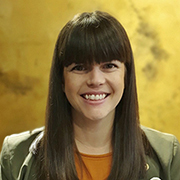Editor’s Note: In September 2020, Rotary formed a taskforce charged with assessing the current status of diversity, equity, and inclusion (DEI) in Rotary and shaping a comprehensive action plan to help us further value and live those principals throughout the organization. This is the first installment of a series of blog posts from DEI Taskforce members reflecting on their work on the committee and why it is critical for the organization.

Katey Halliday is a past president and founding member of the Adelaide City Rotaract Club, chartered in 2012. Recently, she joined the Rotary Club of Adelaide Light. Katey initiated her district’s first-ever participation in the local Pride March celebrations and is a member of her Rotaract club’s Reconciliation Action Plan (RAP) working group, creating a RAP designed to develop respectful relationships and create meaningful opportunities with Aboriginal and Torres Strait Islander peoples. She was awarded a Paul Harris Fellow by her district in 2019 for her vocational contributions to Rotary.
Professionally, she is a diversity and inclusion project officer and training facilitator for South Australia Police where she works on initiatives aimed at creating a diverse and inclusive organization where all people are safe, respected and supported to reach their potential.
Q. As a member of Rotary’s DEI Taskforce, what do you consider to be some of the unique challenges Rotary faces in examining and taking action to strengthen our DEI practices and mindsets? What do you think is needed to overcome them?
Katey: One of the unique challenges is the size of the organization. Our global cultural differences are another. Club cultures with members who are not working in businesses/organizations working towards DEI, may be out of touch with what is happening and expected in corporate/professional realms in terms of DEI.
Big organizations have been working towards DEI for years. Potential new members who are working in these realms may be put off by a club that is not DEI friendly. Rotary needs to fill this gap by providing the education and awareness that workplaces have been doing and continue to do.
Q: What characteristics, values, or experiences can Rotary draw upon to help us become a model for how organizations embrace and live out the values of diversity, equity, and inclusion?
Katey: Look at what other large (especially global) organizations are doing to be more DEI friendly. This is where working with third-party DEI experts will be valuable. We are certainly not the first (and I imagine there are aspects of our organizational culture where we are quite far behind) which means we can learn a lot from others.
Q: How do you expect that the experiences of our members and others will change once we have strengthened our DEI practices and culture throughout the organization?
Katey: There will be some who are already on board with enhancing diversity, equity, and inclusion throughout our culture and they will feel empowered and energized by the positive changes made. There are some who will not agree and will never change and we must ensure they do not hinder progress. But we cannot focus too much effort trying to change them.
The majority of individuals, however, will be in the “movable middle” and we must get them on board through education and awareness of why it is so important, not only to strengthening Rotary for the future, but because it is the right thing to do for the communities we live in. Some of the “movable middle” will be influenced by data and facts and some will be motivated through stories that promote empathy. Eventually, these people will form part of the majority and become the role models and active bystanders who ensure that anything contrary to a DEI culture we want to build will not be tolerated.
Q: What is one meaningful question that every club should pose among its members to start a productive conversation around DEI?
Katey: Start with why – Why is it important for Rotary to be more diverse, equitable and inclusive?
Q: What other perspectives, priorities or thoughts about DEI do you feel it is important for Rotary members to understand?
Katey: Overcoming unconscious bias and the assumptions people make about others based on their personal characteristics will be important for Rotary members in creating change. We also need to acknowledge that everyone can and should be doing something to create change because it cannot be done by leaders alone. Empowering members with things they can do to create change will be important (bystander actions, awareness of reporting mechanisms, supports, etc.)
Learn more about Rotary’s Diversity, Equity, and Inclusion statement and meet other members of the task force.
https://blog.rotary.org/2021/06/08/why-dei-is-the-right-thing-for-rotary/
